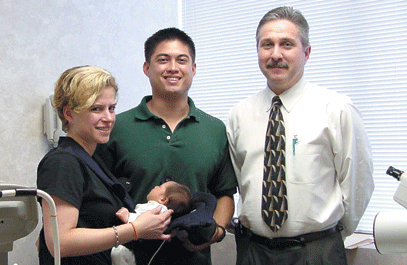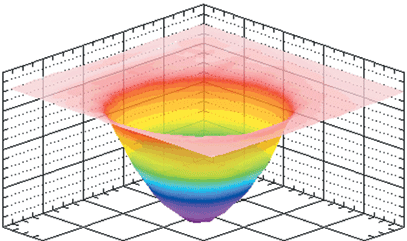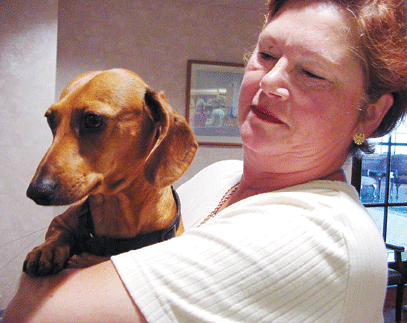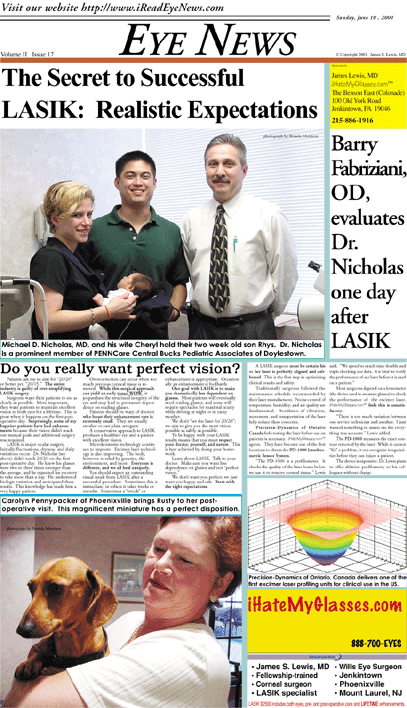Philadelphia / Bucks County LASIK Surgeon – Dr. James S. Lewis
Eye News Volume II Issue 17

Volume II Issue 17
Originally published, Sunday, June 10, 2001
The Secret to Successful LASIK: Realistic Expectations

Michael D. Nicholas, MD, and his wife Cheryl hold their two week old son Rhys. Dr. Nicholas is a prominent member of PENNCare Central Bucks Pediatric Associates of Doylestown.
Barry Fabriziani, OD, evaluates Dr. Nicholas one day after LASIK
Barry Fabriziani, OD, evaluates Dr. Nicholas one day after LASIK
Do you really want perfect vision?
Patients ask me to aim for “20/20” or better yet, “20/15.” The entire industry is guilty of over-simplifying LASIK surgery.
Surgeons want their patients to see as clearly as possible. More important, they want patients to maintain excellent vision in both eyes for a lifetime. This is great when it happens on the first post-operative day. Surprisingly, some of my happiest patients have had enhancements because their vision didn’t reach our mutual goals and additional surgery was required.
LASIK is major ocular surgery. Initially fluctuations, dryness, and daily variations occur. Dr. Nicholas (see above) didn’t reach 20/20 on the first post-operative day. He knew his glasses were two to three times stronger than the average, and he expected his recovery to take more than a day. He understood biologic variation and anticipated these results. This knowledge has made him a very happy patient.
Overcorrection can occur when too much precious corneal tissue is removed. While this surgical approach can yield an early visual WOW, it jeopardizes the structural integrity of the eye and may lead to premature dependence on reading glasses.
Patients should be wary of doctors who boast their enhancement rate is extremely small. They are usually cavalier or just plain arrogant.
A conservative approach to LASIK produces a healthier eye and a patient with excellent vision.
Microkeratome technology continues to improve. Excimer laser technology is also improving. The body, however, is ruled by genetics, the environment, and more. Everyone is different, and we all heal uniquely.
You should expect an outstanding visual result from LASIK after a successful procedure. Sometimes this is immediate, in others it takes weeks or months. Sometimes a “tweak” or enhancement is appropriate. Occasionally an enhancement is foolhardy.
Our goal with LASIK is to make you dramatically less dependent on glasses. Most patients will eventually need reading glasses, and some will require spectacles for maximal acuity while driving at night or in rainy weather.
We don’t “set the laser for 20/20”; we aim to give you the most vision possible as safely as possible.
To be happy with your LASIK results means that you must respect your doctor, yourself, and nature. This is best achieved by doing your homework.
Learn about LASIK. Talk to your doctor. Make sure you want less dependence on glasses and not “perfect vision.”
We don’t want you perfect; we just want you happy and safe. Start with the right expectations.
Surgeons want their patients to see as clearly as possible. More important, they want patients to maintain excellent vision in both eyes for a lifetime. This is great when it happens on the first post-operative day. Surprisingly, some of my happiest patients have had enhancements because their vision didn’t reach our mutual goals and additional surgery was required.
LASIK is major ocular surgery. Initially fluctuations, dryness, and daily variations occur. Dr. Nicholas (see above) didn’t reach 20/20 on the first post-operative day. He knew his glasses were two to three times stronger than the average, and he expected his recovery to take more than a day. He understood biologic variation and anticipated these results. This knowledge has made him a very happy patient.
Overcorrection can occur when too much precious corneal tissue is removed. While this surgical approach can yield an early visual WOW, it jeopardizes the structural integrity of the eye and may lead to premature dependence on reading glasses.
Patients should be wary of doctors who boast their enhancement rate is extremely small. They are usually cavalier or just plain arrogant.
A conservative approach to LASIK produces a healthier eye and a patient with excellent vision.
Microkeratome technology continues to improve. Excimer laser technology is also improving. The body, however, is ruled by genetics, the environment, and more. Everyone is different, and we all heal uniquely.
You should expect an outstanding visual result from LASIK after a successful procedure. Sometimes this is immediate, in others it takes weeks or months. Sometimes a “tweak” or enhancement is appropriate. Occasionally an enhancement is foolhardy.
Our goal with LASIK is to make you dramatically less dependent on glasses. Most patients will eventually need reading glasses, and some will require spectacles for maximal acuity while driving at night or in rainy weather.
We don’t “set the laser for 20/20”; we aim to give you the most vision possible as safely as possible.
To be happy with your LASIK results means that you must respect your doctor, yourself, and nature. This is best achieved by doing your homework.
Learn about LASIK. Talk to your doctor. Make sure you want less dependence on glasses and not “perfect vision.”
We don’t want you perfect; we just want you happy and safe. Start with the right expectations.

Precision-Dynamics of Ontario, Canada delivers one of the first excimer laser profiling units for clinical use in the US.

Carolyn Pennypacker of Phoenixville brings Rusty to her post-operative visit. This magnificent miniature has a perfect disposition.

Over the years, Dr. Lewis has established a reputation as a highly talented, accomplished Philadelphia laser eye surgery specialist. His reputation for excellence attracts patients from throughout the greater Philadelphia area, including Bucks County and Elkins Park Epi-LASIK and ICLs patients.